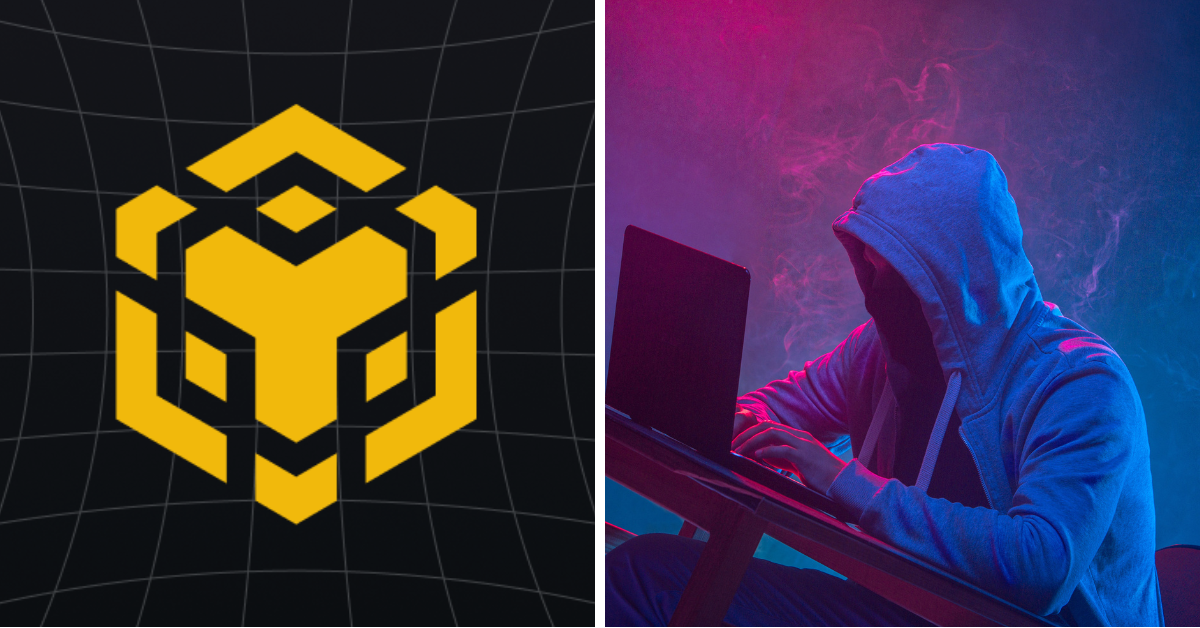College student blockchain cognition survey: 23% don't know anything, 8% are holding money
In the past wave of new ideas and new technologies, colleges and universities have always been at the forefront of the "pioneer laboratory", and the students in colleges and universities have mastered and recognized the innovative knowledge ahead of the public. So, what is the current level of knowledge of the blockchain among college students? PANews launched a survey within the national colleges and universities.
Insights:
- 23.4% of college students indicated that they did not know anything about the blockchain.
- Students in economics, management, and engineering are more interested in the blockchain and are more interested.
- 8% of college students are holding cryptocurrencies; 9% of those who have purchased have now retired and are concentrated in economics.
- The media is the main channel for college students to gain cognition related to the blockchain, but nearly 40% of the students said that media reports are “influential, but have little impact”.
- 26.7% of college students indicated that they would choose to work in the blockchain in the future.
- The blockchain education in colleges and universities is in its infancy, and the opening of college blockchain courses mostly chooses the model of co-construction with industry players.
The respondents were mainly undergraduates, accounting for 77.5%, and graduate students accounted for 17.8%. Most people are in the fields of engineering, literature, management, and economics, accounting for 19.78%, 17.91%, 15.3%, and 14.18%, respectively.
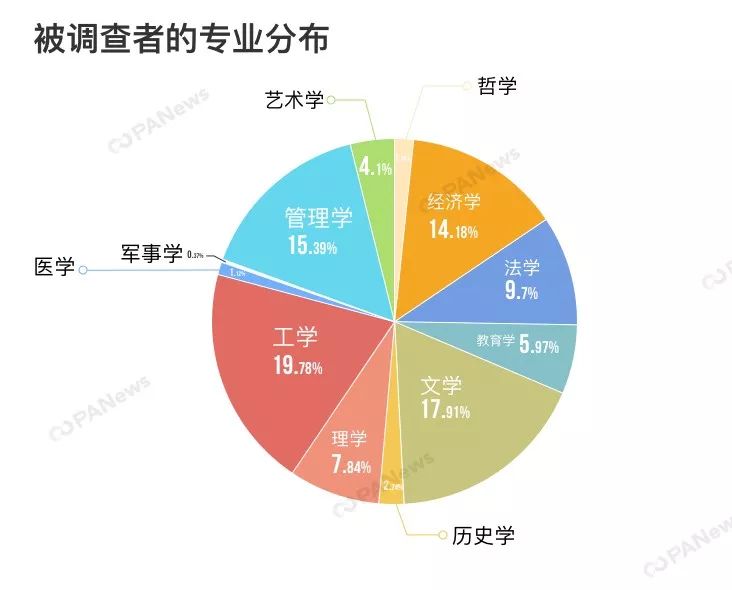
- ConsenSys founder Joseph Lubin: Ethereum 2.0 full shard or will start in 2020
- Heavy! After PayPal, five important Libra members, including Visa, MasterCard and eBay, announced their withdrawal.
- In the second half of the Internet, can the blockchain solve the economic difficulties of the platform?

“I often hear the blockchain, but I still don’t know what it means”
College students' perception of blockchain is not clear. Among the respondents, 23.4% said that the understanding of the basic meaning of the “blockchain” stayed at the “not at all” level, and nearly 30% said they did not understand.
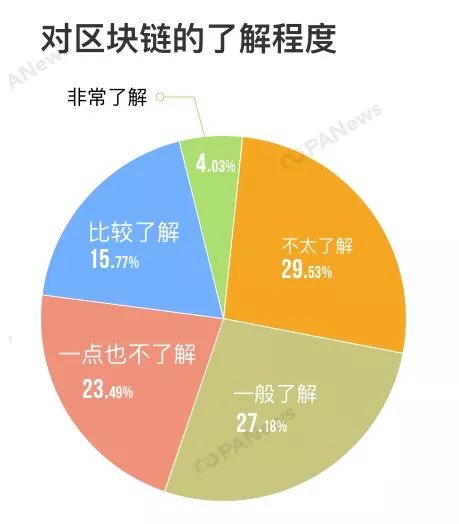
Regarding cryptocurrencies, only 13 people “know it very well”, accounting for 4.2%, and 29% said “not at all”. 67% know about Bitcoin, and 31.6% know Ethereum, but for other tokens, college students are still small. Nearly 15% of people don't know anything about the cryptocurrencies listed. Only 13 of the 13 "very well-known" cryptocurrencies know about the cryptocurrencies listed.
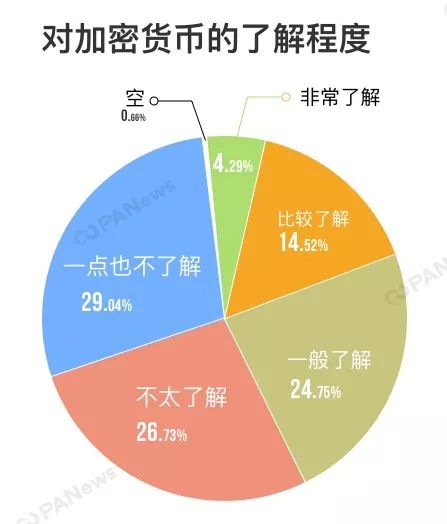
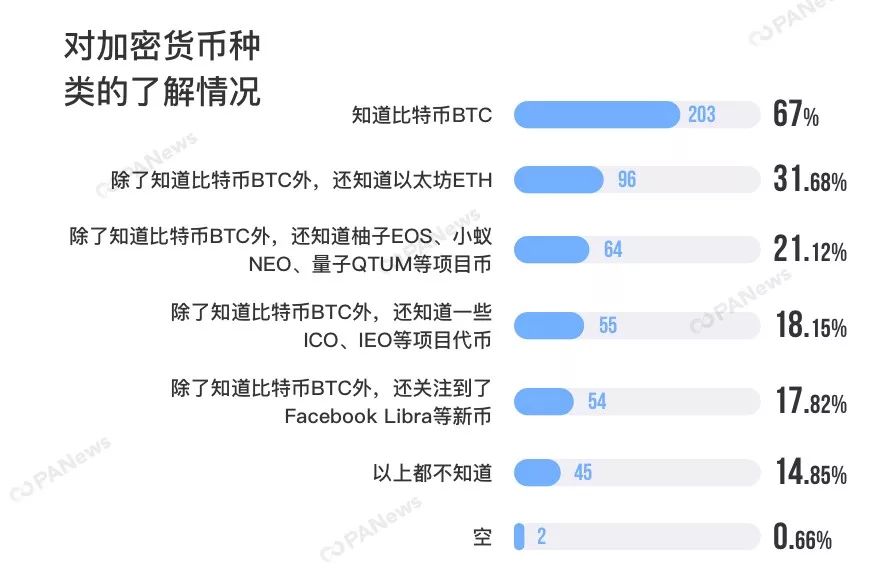
Du Feiya, a student at the School of Economics and Management of East China Normal University, told PANews that in recent years, the term “blockchain” has often been heard in the news media, and students often hear that they are buying coins. “There was a period of intensive listening. When I came to this concept, I was very curious about what it was. Baidu had a bit of it, but I still didn’t understand it. I didn’t manage it anymore.”
In the survey, 11 terms related to the blockchain are listed, such as “cryptocurrency”, “mining”, “computing power”, “hash value”, “DApp”, “anonymous currency”, “stable currency”. Etc. There are only 7 people who know the meaning of 11 words, and only 15 people who know more than 8 terms.
In the survey, six industries that are more commonly used in the blockchain are listed in advance. Only 6.6% of the people know that the blockchain can be used in all six industries, and that more than four people who can use the industry account for 18.2%. 77.2% of people know that blockchain technology is used more in the financial securities industry. Blockchain technology is now more widely available in the industry, but respondents have less knowledge of the use of fashion, humanities and other industries. The concept that finance is the largest application of blockchain has been widely recognized.
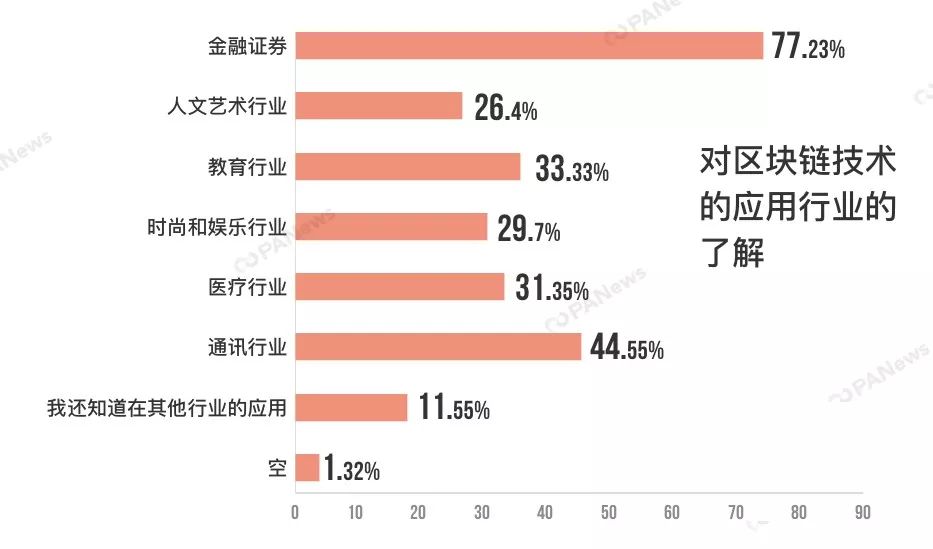
In terms of interest, 22.3% said they were “interested in the blockchain” and 24.4% said they were “not very interested”. Only 7.9% are interested in the blockchain.
Through the cross-analysis of data, it is found that college students' cognition and interest level of blockchain have a great correlation with their majors. Most of the people who are "very knowledgeable" and "very interested" in the blockchain are from economics, management, and engineering. People in the humanities and social sciences, as well as in agriculture and medicine, choose more people who don't know much. "Not very interested." It can be seen that the blockchain is still relatively small and not recognized by most groups in colleges and universities. In terms of academic qualifications, graduate students have a better understanding of the blockchain than undergraduates. In the graduate students, the lowest proportion of the blockchain is “not at all”, which is 20.3%. In the junior college and undergraduate students, the blockchain is “not at all understood”. It accounts for 62.5% and 22.5%.

26.7% of college students said they would choose to work on blockchain in the future.
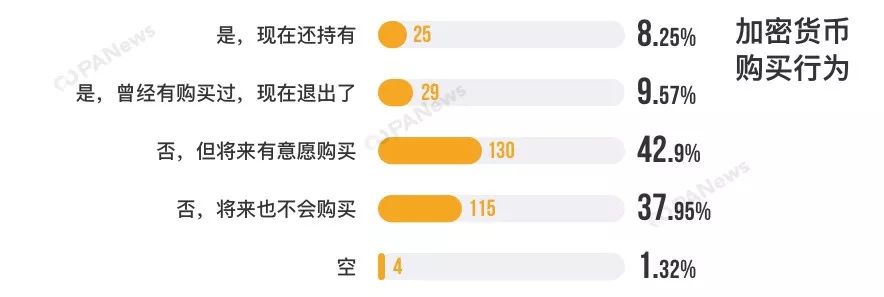
For the first time, 36% of college students heard the word “blockchain” through the mass media, and 15% of students heard it for the first time in class. Nearly half of the college students said that they usually receive blockchain and cryptocurrency-related information through media subscriptions and pushes, and college students who take the initiative to retrieve relevant information account for 41%.
22% of students said that the blockchain-related news that they usually see is more negative than positive; 17% means positive news is more negative than negative. Liu Ziheng of the Institute of Economics of the Shanghai Academy of Social Sciences told PANews that it is necessary to carefully distinguish the types of media and then think about it. "The mainstream media basically has a negative evaluation of the cryptocurrency, either by approval or not, if it is to consider the mainstream media, then It must be negative more than positive."
From this point of view, the media is the main channel for college students to gain cognition related to blockchain, but the media blockchain related reports do not seem to have a significant impact on the blockchain of college students. Nearly 40% of students said “ Influential, but the impact is minimal."

Yang Yuxiang, a Ph.D. student at Fudan University School of Medicine, studied computer science. He told PANews that before he had a systematic professional study of blockchain knowledge, media blockchain related reports had a greater impact on his cognition, but in mastery. After his professional knowledge, he began to "immunize" related reports on the media.
It is worth mentioning that when asked about the impact of media reports on the investment psychology of college students, half (50.16%) of the students have a "positive" influence, resulting in a wait-and-see attitude or admission.
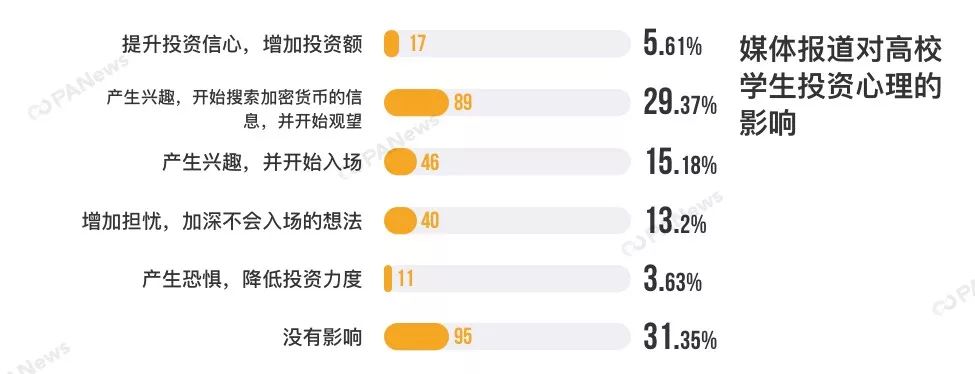
In terms of career choices, 26.7% of college students indicated that they would choose to work in the blockchain in the future. Yu Yunzhi, a student of the Department of Computer Science and Engineering at Shanghai Jiaotong University, told PANews that he might consider working in the blockchain in the future. His subdivision is network security. He believes that the prospect of the blockchain industry is relatively good. .

Blockchain education in colleges and universities that are starting
According to the collected questionnaire data, 76 people reported that their school had courses related to the blockchain, but according to the results of the completed course name, some people filled out “business English” and “in daily life”. The names of courses such as "economics" and "money economy" show that their understanding of blockchain courses is too broad or misunderstood. If two or more students from the same school are filled out as “the school has a relevant course” as the real opening, then 8 of the 131 universities where the respondents are located open a blockchain-related course.
According to relevant media reports, there are currently more than a dozen universities in China (including Tsinghua University, Tongji University, Central University of Finance and Economics, Shanghai Jiaotong University, Fudan University, etc.) to open courses related to blockchain. The Central University of Finance and Economics is the first school in China to offer blockchain-related courses. As early as July 2016, the Central University of Finance and Economics jointly launched a blockchain cooperation project with Century Internet, established the first joint-school laboratory-based laboratory based on blockchain, and opened blockchain-related courses.
In terms of the curriculum model, it seems that both domestic and overseas institutions are mainly based on individual courses or blockchain-related project courses, and there is no actual blockchain professional. Only the University of Nicosia in Cyprus has a master's degree in digital currency, which is the first school in the world to offer a master's degree in digital currency and to allow students to pay tuition using bitcoin.
In addition to the official courses and related projects of the school, the folk student associations and associations are also a part of the current blockchain education in colleges and universities.
Tsinghua University Student Blockchain Association was established in September 2017. It is a spontaneous student association and the first officially registered blockchain student association in colleges and universities nationwide. The association has more than 700 members and more than 10 core members. The members cover most of the faculties in the school. The association regularly organizes offline lectures, seminars and other activities, and the "blockchain technology development open class" is their boutique project.
The blockchain club of Sun Yat-sen University also organizes activities in a similar form. The head of the club, Lai Longqin, told PANews that the establishment of the club originated from the first national blockchain competition. In 2018, he and three other students teamed up to participate in the competition. Later, in the process of communication, I came up with the idea of creating a blockchain club. At present, there are 11 people in the club, mainly computer-based students. Usually, professional teachers are invited to give lectures. The main content of the lectures is some theoretical aspects. In addition, in order to stimulate the ability of club members to learn independently, their members will also take turns to give lectures. Lai Longqin said, "We don't encourage the purchase of coins in our club. This is the tone that was set at the beginning of the establishment."
Conclusion
Most of the students use the mass media to obtain information and information related to the blockchain, but the mass media's acculturation of blockchain cognition is not obvious. College students remain suspicious of relevant reports on the blockchain in the mainstream media. Attitude has little effect on its related cognition.
Text | Zhang Zhuo Editor | Tong, Carol Source | PANews
We will continue to update Blocking; if you have any questions or suggestions, please contact us!
Was this article helpful?
93 out of 132 found this helpful
Related articles
- Science | Blockchain data availability issues and solutions
- Babbitt column | Long Bitcoin, Long the world
- What are the opportunities and challenges for the rise of the token economy?
- Technical point of view | Big country contest, the war of post-quantum cryptography has been ignited?
- Bitcoin options, the next battlefield of the exchange?
- Ratio Chain Research Institute | A Threshold Signature System under the Hypochronous Network Hypothesis
- Bitcoin developers: 51% of attacks are not terrible, terrible is the disregard of decentralization




